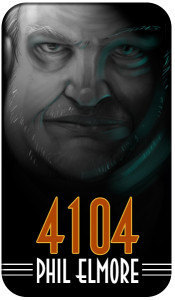Episode 38, “A Tertiary Source”
 He drank deeply. The brown liquid was an old friend. It didn’t burn when he swallowed. Not anymore. Not for a long time. When the glass was empty he poured another double measure from the plastic bag of bourbon, wondering if he should get more ice from the dispenser in the hall.
He drank deeply. The brown liquid was an old friend. It didn’t burn when he swallowed. Not anymore. Not for a long time. When the glass was empty he poured another double measure from the plastic bag of bourbon, wondering if he should get more ice from the dispenser in the hall.
Moxley sat in his walk-up Hongkongtown office off Dragon Street. Here, he was most comfortable. Here, he was surrounded by the debris of his life. As often as he thought the phrase, this was a literal truth and not a metaphor. His every worldly possession was crammed into this single room.
His desk was positioned against a metal-frame bed. Next to his work terminal was a bench grinder; opposite this was a bench bearing a variety of hand tools. Every wall boasted a mismatched shelf full of antique paper books and bound plastics — Moxley’s eclectic reference library, most of which was irreplaceable. A footlocker at the end of the bed contained those items he deemed worthy of extra security. These included his guns, his knives, and his Hongkongtown credentials, the latter stowed in a fireproof insulator.
The blinds over the windows were drawn; the only gap in the sun shields was for Moxley’s air-circ and cooling units. These were a necessity during Hongkongtown’s summers. Any wall space not taken by the windows was devoted to framed photographs and certifications, some of which were quite inexplicable without the back stories behind them. Moxley’s private detective license, certifications from hand-to-hand and weapons courses, his college degree, and several old photos of him with various politicians vied for space with lacquered, mounted fish, wood-cuts of Triad sigils, a painted shield bearing Indonesian blade patterns, and an impressive collage of pub and whiskey-bar coasters.
The remaining floor space was stacked high with suitcases, storage bins, a battered retail clothing rack that Moxley used for his coat and hat, his all-in-one printer-cooler-warmer, an industrial coffeemaker that didn’t work (but which served to support a commercial coffeemaker that did), and a dresser that held the rest of his clothes.
Moxley’s office chair creaked as he leaned back in it. On the desk before him, take-out cartons, wrappers, stacks of data chips, and several tab computers were stacked with obsessive care. These shook ominously when Moxley reached out to grab his drink from the desk. He nearly knocked over the threedy that sat by his keypad. It switched on.
It was the only photo he kept around. The hologram was of his son, Connor, and his wife, Judith. Well. Ex-wife. In the photo, Connor was smiling. Judith was not. Moxley raised his glass to the threedy, brushed the top of its housing with his finger, and drank his glass empty.
He felt his phone vibrate in his pocket and his desktop terminal beeped. Neiring’s face appeared on the desk screen.
“Ray,” said Mox. “Late night for you, isn’t it?”
“Don’t you ever sleep?” Neiring asked.
“Why? You’d be happier if you woke me up?”
“No,” said Neiring. “I’d be relieved you actually slept. And then I’d be sorry I woke you. But we both know I wouldn’t have.”
“Nope,” said Mox. “You wouldn’t have. So what is it?”
“I’ve got a line on VanClef,” said Neiring. “One of my contacts inside the corporation that runs the Promontory knows someone in Intelligence.”
“A tertiary source,” said Mox. He made a rude noise. “Be still my beating heart.”
“Just hear me out,” said Neiring. “Word inside of Intelligence is that VanClef is persona non grata. Anyone close to him is scrambling to put some distance between themselves and his loyalists, to save their careers.”
“So the Man in Black has the stank.”
“The what?”
“The stank, Ray,” said Mox. “Failure. One of these government types gets the stank on him, everybody else runs for the hills. Your source say why?”
“He’s working on it,” said Neiring. “And I’ve greased the tracks as liberally as I can.”
“You’ve what now?”
“Let’s just say you’ll be buying lunch next time.”
“Ray,” said Mox. “I’m proud of you. Resorting to good, old-fashioned bribery. We’ll make a detective of you yet.”
“I have a degree,” said Neiring.
“Don’t we all,” said Moxley. “That and half a chit will get you a handy in the Redlight.”
Neiring rolled his eyes. “When my guy knows more, he’ll call,” he said. “In the meantime–”
“In the meantime,” said Mox, “I’d say now is a great time to sleep and drink. Not in that order.”
“Shouldn’t we plan our next move?”
“What next move?” Mox asked. He fished for his vapor tubes in the pocket of his coat, which he was still wearing. The nights were chilly and he kept his heat set low. “VanClef already put you on notice. Not to mention threatened your life. You really want to poke around in the dark, hunting for clues to you-don’t-really-know-what, until he notices you?”
“I don’t know, Mox,” said Neiring. “But I want to keep digging. We’re close.”
“Close to what?” Moxley said. “And when did this stop being about the Peytons and start being about VanClef?”
Neiring looked down. When he looked up at the video pickup again, he said, “Isn’t it?”
“Yeah, well,” said Moxley. “Something’s fishy, that’s for sure. But Ray, I get the distinct feeling we’re not in the loop on this.”
“You too?”
Moxley put a vapor tube in his mouth. He fumbled it and dropped it in his lap, which caused it to fall on the floor. “Hang on,” he said, bending to retrieve it.
The window next to him exploded.
Moxley hit the floor as full-automatic gunfire punctured his window blinds and blew ragged holes in the plasticboard of the opposite wall. Pieces of polyglass sprinkled his back. Neiring’s image was annihilated by a bullet. A long string of projectiles smashed the work terminal to shards and ripped up the surface of the desk.
“Great,” he muttered from the floor. “This is just holing great.” He crawled across the filthy carpet, toward the footlocker, while the gunman outside changed position and began raking the office from side to side. The gunfire was loud but not deafening. A nailer, he figured, judging from the alloy spikes embedded in his desk and walls.
He took a nail through the web of his left hand while opening the footlocker. Another nail nicked his ear, scaring him badly. Blood trickled down the side of his head. From inside the locker, he grabbed the one thing he wouldn’t have to aim to fire, the one item he was absolutely not supposed to have here in Hongkongtown.
When he pulled open the plastic cylinder of the heat-seeking rocket tube, the proctile inside fired automatically. It filled the office with smoke and set the carpet on fire. Moxley coughed and stamped out the flames while the missile hove away, out the window and into the night–
Daylight flared as the missile hit the closet heat source it found. Mox squinted away, face in the scorched and bloody carpet. His hand ached. His ears rang.
The light died. Through the broken window, he could hear rain. Somewhere in the building, smoke- and fire-klaxons were hooting.
He stood. On his desk, the threedy sat untouched. A trio of nail rounds was embedded in the desk next to it.
Moxley bent and grabbed a laser rifle from the locker. His left hand hurt badly. Shouldering the laser, he went to the window, careful not to expose himself to a second shooter. On the ground two stories below, he saw what looked like the burning chassis of a hydrogen cycle. Scattered through the alley around the cycle were gobbets of cooked meat that he assumed were his would-be assassin.
“Amateur,” said Moxley to the rain.



